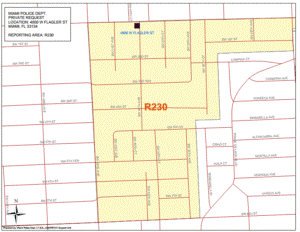

The School Director and Student Services Director have the responsibilities for compliance with the Clery Act. These procedures set forth the specific New Professions Technical Institute responsibilities with respect to the Clery Act.
I. DEFINITIONS
The following terms are used in these procedures and/or the campus Clery Act Policy:
Annual Security Report: A required annual report setting forth statistics for Clery Act Crimes and disciplinary referrals for drug, alcohol, and weapon offenses by type, location, and year; statistics for campus security and safety policy statements; procedures for issuing to the campus community Timely Warnings of potentially dangerous criminal and emergency situations; campus evacuation procedures; and locations for obtaining information concerning registered sex offenders from state law enforcement agencies.
Campus Security Authority (CSA’s): The School Director acts as the Clery Act Coordinator (CAC). In cooperation with the City of Miami Police Department (CMPD), the CAC has responsibility for overall campus security. The School Director maintains overall responsible for student discipline and campus judicial proceedings, and who has the authority and the duty to take action or respond to particular issues on behalf of the campus. When acting within the scope of their official responsibilities, Pastoral Counselors, Professional Counselors, and uncertified persons who are acting under the supervision of an exempt counselor, are not CSA’s.
Clery Act Crimes: Certain crimes specified in the Clery Act, and further described in Appendix A, on which the campus must compile statistics of reports made to the CMPD. Other forms of criminal violations include: aggravated assault; arson; burglary; motor vehicle theft; murder and non-negligent manslaughter; negligent manslaughter; robbery; forcible and non-forcible sex offenses; hate crimes; domestic violence; dating violence; and stalking are all reportable to law enforcement authorities.
Clery Compliance Coordinator: The School Director acts as the Clery Act Coordinator (CAC) to coordinate all campus activities regarding the Clery Act compliance program.
Clery Geography Map: A map depicting the Core Campus and surrounding area that identifies On-Campus Property, Non-Campus Property, and Public Property.

Core Campus: The same reasonably contiguous area of building or property located at 4000 West Flagler Street, Miami, FL 33134, that is owned or controlled by NEW PROFESSIONS TECHNICAL INSTITUTE, LLC that the campus and its students consider to be, and treated as, an integral part of the main campus; that are directly supported, or related to the campus’ educational purposes; and that are covered by the same security and safety policies.
Daily Crime Log: A log maintained by the CAC of any and all alleged criminal incidents reported to the School Director and the CMPD.
Emergency Notification: An announcement called NPTI Alert to inform the campus community of a significant emergency or dangerous situation involving an immediate threat to the health or safety of students or employees on the campus.
On-Campus Property: NPTI Campus. On-Campus Property includes streets, sidewalks, and student parking areas (located between SW 41st and SW 40th Avenues along West Flagler Street).
Pastoral Counselor: NPTI has no Pastoral Counselor.
Professional Counselor: NPTI has no Professional Counselor.
Public Property: All public property, including thoroughfares, streets, sidewalks, and parking facilities, that are within the NPTI Campus or immediately adjacent to and accessible from the NPTI Campus. Public Property includes, for example, city streets (e.g., West Flagler Street, SW 2nd Street, 40th and 41st Avenues).
Timely Warning: An announcement called “NPTI Warning Alert” to inform the campus community of Clery Act Crimes and other serious incidents when a reported crime may pose a serious or continuing threat to the campus and surrounding community.
RESPONSIBILITIES
A. General Responsibilities
B. If you witness a Clery Act violation you should:
Faculty
Staff
Student
C. New Professions Technical Institute, Inc. (NPTI) Responsibilities:
D. Human Resources Responsibilities:
E. Admissions Office Responsibilities:
F. Clery Act Coordinator (CAC) Responsibilities:
APPENDIX A
Definitions of Clery Act Crimes
Murder and Non-negligent Manslaughter: The willful (non-negligent) killing of one human being by another.
Negligent Manslaughter: The killing of another person through gross negligence.
Sex Offenses: Any sexual act directed against another person, without the consent of the victim, including instances where the victim is incapable of giving consent.
Rape: The penetration, no matter how slight, of the vagina or anus with any body part or object, or oral penetration by a sex organ of another person, without the consent of the victim.
Fondling: The touching of the private body parts of another person for the purpose of sexual gratification, without the consent of the victim, including instances where the victim is incapable of giving consent because of his/her age or because of his/her temporary or permanent mental incapacity.
Incest: Non-forcible sexual intercourse between persons who are related to each other within the degrees wherein marriage is prohibited by law.
Statutory Rape: Non-forcible sexual intercourse with a person who is under the statutory age of consent.
Registry Sex Offenders
Anyone can view a list of registered Sex Offenders and Predators in the state of Florida by visiting the Florida Sexual Offenders and Predators Registry website at: https://offender.fdle.state.fl.us/offender/homepage.do;jsessionid=+qCMGF82tXFXaQk0FHwQg+C8
Anyone can view a list of registered Sex Offenders and Predators in a one-mile radius of the NPTI campus by visiting the Florida Sexual Offenders, and Predators Neighborhood Registry website is: https://offender.fdle.state.fl.us/offender/searchNeighborhood.do Toll – Free 1-888-357-7332 (Mon – Fri from 8am – 5pm). You can also call a local number: 1-850-410-8572
Miami-Dade Police has a Sexual Offender and Predator link on their website that you obtain information by visiting: http://www.miamidade.gov/police/predators-offenders.asp
You can find sexual offenders/predators in your neighborhood with a map that allows you to search by address, intersection, landmark, or school by visiting: http://gisweb.miamidade.gov/sexoffenders/
2500-foot Residence Address Compliance ARTICLE XVII
The Lauren Book Child Safety Ordinance, Section 21-277 deems it unlawful for any person that has established residency on or after November 25, 2005, and has been convicted of a sexual battery, lewd and lascivious act on/in the presence of persons under age 16, sexual performance by a child, sexual acts transmitted over computer, or selling or buying of minors for portrayal in sexually explicit conduct, in which the victim of the offense was less than sixteen (16) years of age, or similar law of another jurisdiction, to reside within 2,500 feet of any school. “School” designated as a public or private kindergarten, elementary, middle or secondary (high) school. Please refer to Miami-Dade Ordinance ARTICLE XVII for the full text.
Florida Statutes 775.215 deems it unlawful for any person convicted of a sexual battery, lewd and lascivious act on/in the presence of persons under age 16, sexual performance by a child, or selling or buying of minors for portrayal in sexually explicit conduct, in which the victim of the offense was less than sixteen (16) years of age, or similar law of another jurisdiction, to reside within 1,000 feet of any school, daycare center, or playground. This applies to any person for offenses that occur on or after October 1, 2004. Please refer to Florida State Statutes 775.215 for the full text. Miami-Dade County provides this site displaying information regarding the statutes described above as a courtesy. Information is received from multiple sources. Miami-Dade County does not assume responsibility for the accuracy or timeliness of the information displayed. This site should only be used as a guide.
Robbery: The taking or attempting to take anything of value from the care, custody, or control of a person or persons by force or threat of force, violence, and/or causing the victim fear.
Aggravated Assault: An unlawful attack by one person upon another for the purpose of inflicting severe or aggravated bodily injury. This type of assault usually is accompanied by the use of a weapon or by means likely to produce death or great bodily harm. (It is not necessary that injury result from an aggravated assault when a gun, knife, or other weapon is used which could or probably would result in a serious potential injury if the crime were successfully completed.)
Burglary: The unlawful entry of a structure to commit a felony or theft. For reporting purposes, this definition includes unlawful entry with intent to commit a larceny or a felony; breaking and entering with intent to commit a larceny; housebreaking; safecracking; and all attempts to commit any of the aforementioned.
Motor Vehicle Theft: The theft or attempted theft of a motor vehicle. (Classify as motor vehicle theft all cases where automobiles are taken by persons not having lawful access even though the vehicles are later abandoned-including joy riding.)
Arson: Any willful or malicious burning or attempt to burn, with or without intent to defraud, a dwelling, house, public building, motor vehicle or aircraft, personal property of another, etc.
Dating Violence: Violence committed by a person who is or has been in a social relationship of a romantic or intimate nature with the victim; (1) The existence of such a relationship shall be determined based on the reporting party’s statement and with consideration of the length of the relationship, the type of relationship, and the frequency of interaction between the persons involved in the relationship. (2) For the purpose of this definition – (i) Dating violence includes, but is not limited to, sexual or physical abuse or the threat of such abuse; (ii) Dating violence does not include acts covered under the definition of domestic violence.
Domestic Violence: A felony or misdemeanor crime of violence committed
Stalking:
Weapons: Carrying, Possessing, Etc.: The violation of laws or ordinances prohibiting the manufacture, sale, purchase, transportation, possession, concealment, or use of firearms, cutting instruments, explosives, incendiary devices, or other deadly weapons.
Drug Abuse Violations: The violation of laws prohibiting the production, distribution, and/or use of certain controlled substances and the equipment or devices utilized in their preparation and/or use. The unlawful cultivation, manufacture, distribution, sale, purchase, use, possession, transportation, or importation of any controlled drug or narcotic substance. Arrests for violations of state and local laws, specifically those related to the unlawful possession, sale, use, growing, manufacturing, and making of narcotic drugs.
Liquor Law Violations: The violation of laws or ordinances prohibiting the manufacture, sale, purchase, transportation, possession, or use of alcoholic beverages, not including driving under the influence and drunkenness.
Hate Crimes: A crime involving one or more of the above listed crimes, the crimes of theft, simple assault, intimidation and/or vandalism reported to local police agencies or to a campus security authority that manifests evidence that the victim was intentionally selected because of the perpetrator’s bias against the victim. The categories of bias include the victim’s actual or perceived race, religion, gender, gender identity, sexual orientation, ethnicity, national origin, and disability.
Larceny-Theft (Except Motor Vehicle Theft): The unlawful taking, carrying, leading, or riding away of property from the possession or constructive possession of another. Attempted larcenies are included. Embezzlement, confidence games, forgery, worthless checks, etc., are excluded.
Simple Assault: An unlawful physical attack by one person upon another where neither the offender displays a weapon, nor the victim suffers obvious severe or aggravated bodily injury involving apparent broken bones, loss of teeth, possible internal injury, severe laceration, or loss of consciousness.
Intimidation: To unlawfully place another person in reasonable fear of bodily harm through the use of threatening words and/or other conduct, but without displaying a weapon or subjecting the victim to actual physical attack.
Destruction/Damage/Vandalism of Property: To willfully or maliciously destroy, damage, deface, or otherwise injure real of personal property without the consent of the owner or the person having custody or control of it.
APPENDIX B
Notice of the Annual Security Report
New Professions Technical Institute Annual Security Report is available here
This report includes statistics from the previous three years concerning reported crimes that occurred on campus and in certain off-campus properties. The report also includes institutional policies concerning campus security and other safety information. You may obtain a hard copy of this report by contacting the Director of Education or by accessing the following link